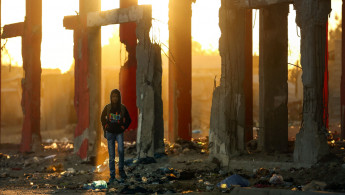UN appeals for $547 million in aid for Palestinians
A $547 million (524 million euros) appeal to help 1.6 million people in the Palestinian territories was launched by the United Nations on Monday, to aid those struggling to survive during the upcoming year.
The response covers 1.1 million residents of the Gaza Strip, which has been under an Israeli blockade for the past decade, and half a million people in the occupied West Bank.
"Needs in Gaza remain particularly acute and humanitarian services provided by the international community remain a lifeline," said Robert Piper, UN humanitarian coordinator for the Palestinian territories, in a letter accompanying the launch.
The appeal was down from $571 million the year before, of which about 47 percent, or $267 million, was met.
The United Nations has warned that tiny but densely populated coastal enclave could become uninhabitable by 2020 if current trends continue.
The most recent conflict between Israel and Gaza ended in August 2014 but Israel has maintained tight restrictions on the enclave, while Egypt has also closed its border.
Politically there has been few positive trends in 2016, with plans for a unity government stumbling amid deepening divisions between rival Palestinian factions.
Attempts to encourage new peace negotiations between Israel and the Palestinian leadership, stalled since 2014, have also failed.
Piper said in a separate statement that without political reform and a meaningful peace process, international aid was "just trying to buy time".
"This humanitarian response must be coupled with bold political action," he said.
The launch of the appeal follows a UNICEF report that found 41.8 percent of Palestinian children have more than one disability, with the prolonged conflict surrounding them and cultural stigmas leaving them in a "dire situation".
Devastated infrastructure, a fractured economy and the overwhelming demand on service providers in the West Bank and Gaza has made disabled children and their families particularly vulnerable.





 Follow the Middle East's top stories in English at The New Arab on Google News
Follow the Middle East's top stories in English at The New Arab on Google News


